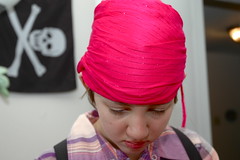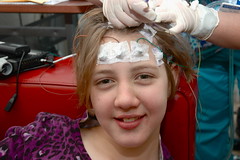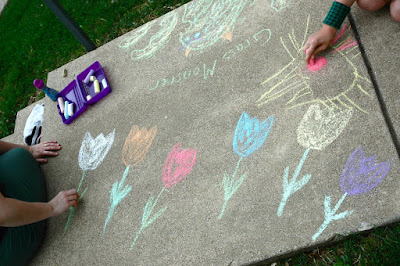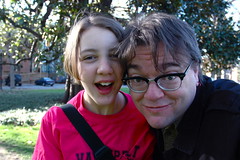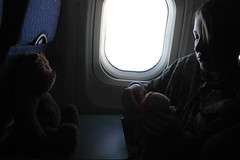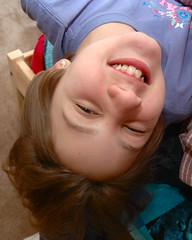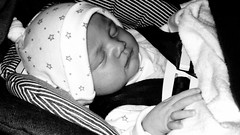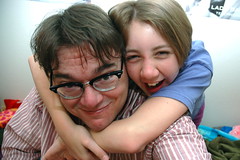I didn't know what to think the first time I read these words by Jean Vanier. They were quoted in Ian Brown's The Boy in the Moon, an extraordinary memoir written by the father of a profoundly disabled son. Brown's story is different from mine; his son Walker's disability is as extreme as Schuyler's is subtle. And yet in reading his words, I am struck by the similarities in our feelings about our beautiful broken children, extending even to some of the language we use as descriptors.
(Ironically, we differ slightly on the now-tiresome "r word", which he uses in some circumstances not related to people. But while I choose not to use the word as he does, I also recognize the unique position of the special needs parent to repurpose words like that, and the guilty pleasure that comes from the reactions of typical parents when faced with this forbidden word from the mouth of such a parent. I totally get that.)
When I read the quote by Vanier, it felt a little like some of the well-meaning but pretty uniformly awful things we've been told for years, about how kids like Schuyler are here to teach the rest of us something, or that she came into our lives because we were super special wonderful parents, or that God never gives us more than we can handle. (That last one is particularly heinous; ask any parent of a different child, and they'll be able to name people of their own acquaintance who have been given much more than they can bear, whether by a cruel God or wicked chance.)
But when you look deeper, it makes a kind of sense. A writer friend of mine was raised as a Quaker, and to her it was completely familiar. To the Quakers, God is a light that exists in every human, an intrinsic quality rather than an external force (ie. grumpy man in the sky, bossing everyone around and breaking stuff when he gets mad). We find God by seeking that light in others. Finding it within those whose lives seem the most remote from our own, and relating to those people instead of marginalizing them or running, that's a real path to seeing God.
I like that. I'm not sure I subscribe to it from a spiritual perspective, although it feels valid to me. My own spirituality runs outside of religion, as you probably already know. Recently, I received another critical remark about my beliefs. "The atheist pulling out the phrase 'Child of God' only when it suits you is so very distasteful." Of course, I have never claimed to be an atheist, not once, but there's a certain amount of dismissiveness that comes in response to calling oneself an agnostic. This commenter doesn't think I'm an atheist. But she does know that I'm not a Christian, and in her eyes, that's not all that different from believing nothing at all. Not being a Christian is offensive to a great many people, as is the idea that Schuyler isn't here to teach us all how to be better people.
 For his part, Ian Brown doesn't believe that his son Walker represents the face of God. He sees instead the face of what it means to be a human being, both in his son's beauty and his brokenness. He sees the depth and complexity of his own love for his son, who has taught him (and I can't tell you how much Julie and I love this phrase, or how many times in the last week we've quoted it to each other and have wanted to quote it to people who are in our world and yet very much not) "the difference between a real problem and a mere complaint". For him, his son is a mirror.
For his part, Ian Brown doesn't believe that his son Walker represents the face of God. He sees instead the face of what it means to be a human being, both in his son's beauty and his brokenness. He sees the depth and complexity of his own love for his son, who has taught him (and I can't tell you how much Julie and I love this phrase, or how many times in the last week we've quoted it to each other and have wanted to quote it to people who are in our world and yet very much not) "the difference between a real problem and a mere complaint". For him, his son is a mirror.I like that, too. In the faces of kids with disabilities, whether extreme like Walker Brown or mostly invisible and insidious like Schuyler, we are presented with the opportunity to truly explore what it means to be human. Brown says that Jean Vanier believes the severely afflicted force us to face two difficult questions. "Do you consider me human? Do you love me?" He believes, as I adamantly do as well, that as we meet people with disability in their own world, our answers to those questions evolve and solidify. We start, shamefully, with fear, of their appearance and the way they behave, and, I'd suggest, of the proof of the frailty of being human and how it can strike any of us, particularly our children. We move on to pity and to the stage where we help them and show them respect, but still regard them on some level as inferior.
It is only when we enter into real relationships of authentic depth that we are transformed by the broken among us. It is then, Vanier believes, that "they bring us closer to God".
As an agnostic, I nevertheless believe, on some level, that this is true. God? Maybe. It certainly brings us closer to understanding the truth of humanity, the hard-to-grasp reality that all of us have worth, and that worth is intrinsic, not something determined by the rest of us, or by an outside divine force. Other cultures understand that better, I think. In shamanistic societies, children who would be diagnosed as autistic or developmentally delayed or ADHD and medicated within an inch of their lives in this country are identified and groomed from an early age to serve as shamans, holy and in touch with the universe on a unique plane that is denied the rest of us. Is that wrong? Is it ridiculous or primitive? Or does it recognize a fact mostly lost on Western society, that even the most profoundly broken among us have value, and it is up to us to see that, not them to prove it?
In an interview with NPR, Ian Brown said something that hit close to home for me. It felt like truth, a cautionary truth.
"I think a disability masochist is somebody who made the decision to make their disabled child the most important thing in their life and the only important thing in their life. And they commit to that position and then when reality suggests there are other decisions, they get angry about it. It's like anybody who concentrates on one point of view and only one point of view. If you contradict them, they get nasty. You see it in political life every day. You often hear from these people something that drives me mad. It's one of the reasons I didn't want to write a book like this, and one of the reasons it took me so long to write the book was because I didn't want to write a 'misery memoir.' These misery memoirs, in addition to being badly written, you get the same sentimentality all the time: these are very special children, given to very special parents, by a very special God. The God thing is not often there, but it's often tacked on. And I think to myself, if Walker is God's idea of a gift, then God needs to read Emily Post. Because a jar of jam or a bottle of wine would have been fine, thank you very much."
I fear very much that I have become what he calls a "disability masochist", although honestly, I wonder sometimes how one avoids that trap. But for me, in ways that are probably much more difficult for parents with as impaired of a child as Brown has, it's more complicated than just making my disabled child the center of my life. I have done that, but it's not always or even mostly about her disability. In part, it happens because of the all-encompassing, complicated, enriching but enslaving love I feel for Schuyler. I suspect it's also because in trying so hard to understand the things that she desperately wants to tell us, we pay much closer attention to Schuyler than most parents do to their typical children. Schuyler doesn't have throw-away statements or everyday sentiments. We listen with every ounce of attention that we have, we strain to understand, and in doing so, we are treated to peeks inside a place unlike that of any other person in the world. Perhaps literally so.
There are moments, fleeting and wonderful, where it is possible, not to forget exactly, but to put Schuyler's disability into the background. It's always there, but sometimes it's unimportant, and what we are left with is a very simple (but of course not simple at all) joy of her existence. We can stop trying to make her fit and just experience who she is.
It happens, although the world has a funny way of popping that bubble. Last night, as we ate dinner at a fast food place, Schuyler was unusually joyful and chattery. I love when she's like that; I rarely try to stifle her in those moments, even when I can see, as I did last night, that she is drawing attention. This time it was a little girl, a few years younger than Schuyler, sitting at the table next to us. As we got up to throw away our trash, I heard her ask her father if Schuyler was retarded.
And thus the world pushes back in.
Schuyler and her broken friends aren't a gift, from God or anyone else. They exist on their own terms, as human as you or me, but they do give us the chance to look into something bigger, God if you like, or perhaps simply our own humanity, with all the ugliness and beauty inherent in our selves. We have a choice, whether to listen or to step back in fear and ignorance. I can only say that one of those choices is, even to an agnostic like myself, indescribably miraculous.
